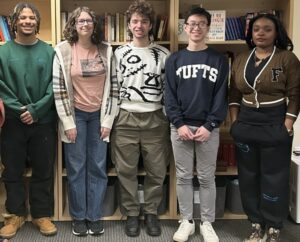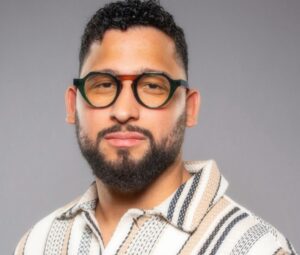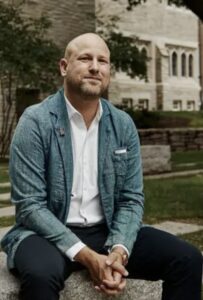A Course on Humanism for Everyday Life
 Tufts University students
Tufts University students What unfolds when intentional spaces are cultivated to explore the essence of humanity? How can we engage in an embodied humanism that embraces the diversity of experiences and complex histories to envision more ethical futures?
For Anthony Cruz Pantojas and the students in the course “The Practice of Being Human: Humanism for Everyday Life,” at Tufts University last semester, these pivotal questions took center stage. Over thirteen weeks, each session delved into the utility and significance of humanism in addressing life’s enduring questions and complex challenges.
Weekly topics included “Who is the Human?” “Otherwise Genres of the Human,” “Humanism as an Aesthetic Sensibility,” and “Inter-relational Humanisms.” Cruz Pantojas, the course instructor, leveraged their expertise as a scholar and chaplain to guide students in challenging normalized truths, offering perspectives on the human condition, and envisioning social justice and liberation beyond the Western canon. This course is groundbreaking as the first of its kind at Tufts University and The Experimental College, an innovative center for teaching and learning where the course is housed.

Humanist Chaplain at Tufts University and course instructor Anthony Cruz Pantojas (photo by Anoriginal Photography)
In various contexts, Cruz Pantojas identified a need for more “creative containers” for dialogue and strategic risk-taking, especially amid the current backdrop of contempt and hyperpolarization. They expressed:
This course emerged from my experiences and inquiries as a cuir/queer Afro-Latiné Humanist Chaplain. I contemplated identity, the challenges, and possibilities of difference. I identified certain unmet needs, including the presence and representation of the global majority in the Humanist/Freethought Movements. I also aimed to engage others in discussions about our individual and collective roles in perpetuating oppressive systems and, more importantly, devising mechanisms within and beyond institutions to challenge the status quo. I wanted to explore what might be missing in our histories that document the human experience.
Anthony employs a warm pedagogical approach in the classroom. Their ability to seamlessly transition from history and philosophy to theory and practice helps crystallize the essential questions outlined in the syllabus. They explained their pedagogical choices:
In a course as eclectic as this one, you can’t be overly didactic. I am not the ultimate authority. We acknowledge that we don’t possess all the knowledge in the world. I support students, their interests, and ways to help them make the most of materials and discussions, which hopefully advances whatever they want to do.
While students entered the course with varying levels of understanding of Humanism, they all utilized the frameworks presented in class discussions as heuristics to examine their own lived histories and experiences. Dre approached Humanism from the perspective of a student with a religious Christian background:
I grew up with a religious Christian background, and I started to drift away from that. So when I saw Humanism… I’ve never heard about it before, so I thought it [would be] interesting to take this class. When thinking about the future, I’m just on autopilot… my life is mostly surrounded by my schoolwork, so I’m not really thinking about myself personally. Over the course of the class and the stuff we talked about, I feel like one thing that’s left me curious is humanism and politics.
Mark, a first-year student, entered the course questioning his Catholic background:
I was raised Catholic and coming to college and through high school, I started to have questions about that and started to feel some separation from that faith. I wanted to explore something that was kind of like square one, the foundation of foundation, the human, what we all have with each other and how we can embrace that in daily life. I liked that it was something that was here and now… And so, I think my question that I’m kind of left with is how people practice being human in their own ways because, in my mind, maybe humanism is not necessarily something to be learned but rather discovered in yourself?
Mia, a third-year student, found her understanding of self to be complex:
I think for me personally, what I’ve realized over the course of this semester and with this class specifically is that I don’t have a good grasp on myself. Earlier, we had to do a mind map, and I can think of maybe three things. They were all academically related. That kind of tells something about just how much I view myself as a human. So, I think what I’m realizing over the course of this year is I need to really sit down and figure out who I am.

Greg Epstein (photo by Cody O’Laughlin)
The course also featured guest lecturers, including Greg Epstein, the Humanist Chaplain at Harvard and MIT; Dr. Jé Exodus Hooper, Interim Minister of Lifelong Education at First Unitarian Society of Minneapolis; and Dr. Khandra T. Sears, President of the American Ethical Union. Reflecting on his experience with the class, Epstein shared that it “offers an extraordinarily progressive, socially relevant, and innovative approach to understanding what humanism actually is.” Sears praised the course for providing an alternative platform for students exploring non-theistic traditions:
It’s not often that I get to talk about my experience with Humanism and Ethical Culture with people outside of the movement. It’s also not common to have the opportunity to speak on this as a Black woman. I didn’t have that sort of exposure to non-theistic religions or movements as an undergraduate, and it was interesting to hear students posing the same questions. It was a welcome opportunity to reflect on a fairly small secular religious movement in the US.
Fulfilling the promise of more ethical and liberatory futures is a commitment that Cruz Pantojas takes seriously. They recall a poignant question posed by one of their mentors, Dr. Monica R. Miller:
How might we begin to calibrate and recalibrate the ways in which we relate to each other and ourselves in a world dominated by classifying, marking, and hierarchizing human social difference?
Perhaps, they suggest, communing together to practice being human is a meaningful starting point.
